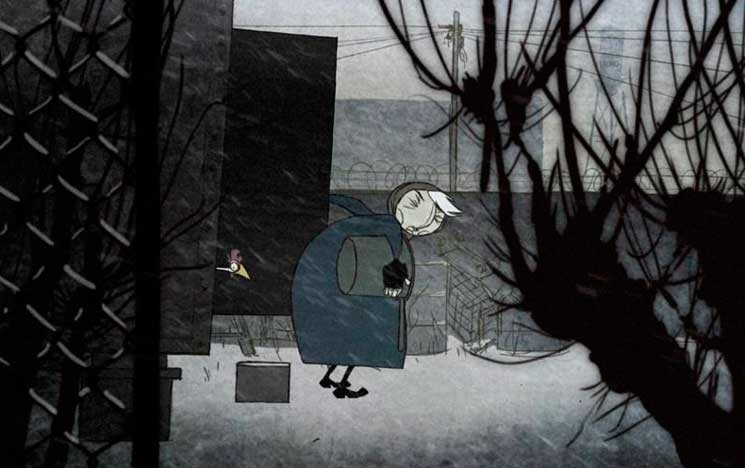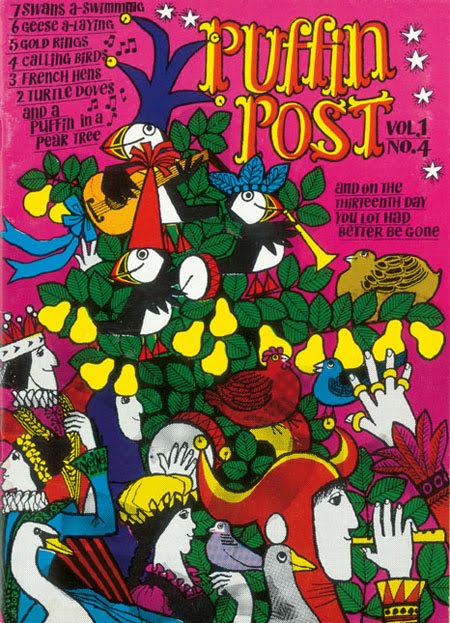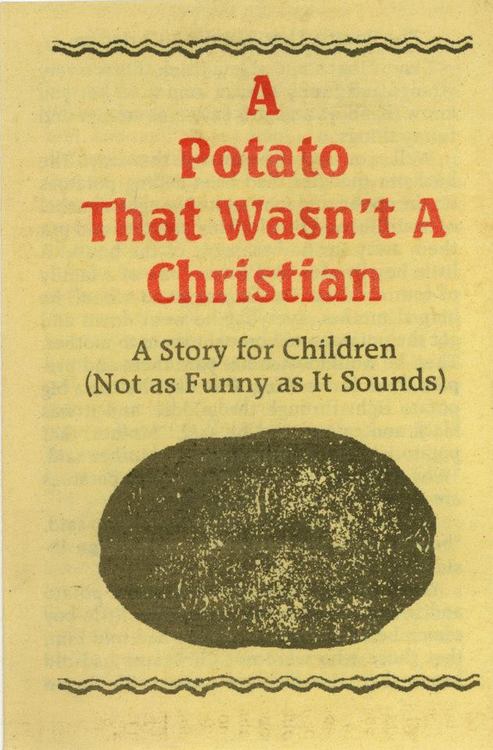In the course of an arduous hiking escapade, somewhere far far away Salim Fadhley stumbled upon this mysterious monument.
Monthly Archives: September 2013
By Kayak To The Kiosk
I was mad for a choc ice, but the kiosk was afar, on the other side of the lake. Several times, in the past, I had walked the path all round the lake, and I knew what a long long walk it was. From where I stood, anent Nitty’s Jetty, gazing hopelessly at the kiosk, I knew it would take me an hour, an hour and a half more likely, in my flimsy pumps, to walk that far. No man should wait so long for a choc ice – was that a saying?, or had I just coined one? The sight of the kiosk taunted me, so I shut my eyes.
It is a curious fact that whenever I close my eyes, for longer than a blink, I run the risk of falling asleep. The great French artist Delacroix held it as a tenet that the key to a long life lay in getting up early in the mornings and, most important, not dozing off again once one was awake. If that were the case, it is a miracle I am still alive in my eighty-eighth year to heaven. I doze off all the time, even here, choc ice mad, standing up straight on the edge of the lake, with nothing to cling on to. The wooden posts of Nitty’s Jetty long ago rotted to stumps.
And as I slept, so I dreamed. I was five or six, at a different lake, queuing in a line at a different kiosk, a now-redundant coin gripped in my tiny fist. Though I could not see him, I knew the kiosk was manned by an ogre, and a Cyclopean ogre come to that. He is a figure who recurs in my dreams, and though his countenance is fearsome, I feel nothing for him but boundless devotion. I do not think he is a god, this ogre, but the emotions he stirs in me are those I imagine one would feel if one came face to face with God. I shuffled slowly forward, for the queue was long, and I felt my heart beat the faster as I got closer to the kiosk. Soon, oh soon, I would reach the head of the queue, and I would look up into the one blazing eye of the ogre and I would proffer my coin and ask politely for a choc ice, and the ogre would grunt and thrust towards me his hairy paw, in which was clutched . . .
My eyelids snapped open as I awoke from my doze. The dream fell away in an instant. Scudding towards me, upon the lake, came a kayaker in his kayak. Now I knew a thing or two about kayaks, or once did, for in my long ago youth I had been a keen kayaker. I kayaked on several lakes and rivers, remote distant lakes and wide important rivers. I admired this kayaker’s technique and told him so as he came nudging against Nitty’s Jetty. We fell into the kind of easy conversation that obtains among kayakers, even when one of them is eighty eight and unkayaked.
– Do you know what?, he said, after a while, I could kill for a choc ice. How about you? Jump into the kayak and we’ll kayak across the lake together and I’ll buy a couple of choc ices from that kiosk. My treat.
I told him he was very kind, and clambered into his kayak. It must have been forty years since I was on the water. Since the terrible day of Mopsa’s drowning I had shunned it. Another lake, another time . . .
And the sky blazed blue as I was ferried in a kayak across the lake towards the kiosk.
Custard, A Duck, And Canadian Owls
Over at The Dabbler today, the final set of Brief Lives for the time being. This week features custard, a duck, and Canadian owls.
You can listen to some of these and other Brief Lives on yesterday’s Hooting Yard On The Air, now available on soundcloud. The show also includes a reading of The Pirate’s Tale by Janet Aichison (age five and a half).
No Cows
We are mistaken if we think that there is, in ultimate reality, any such thing as a cow.
Arthur Machen, The London Adventure or The Art Of Wandering (1924)
Beulah
There are certain parts of Clapton from which it is possible, on sunny days, to see the pleasant hills of Beulah, though topographical experts might possibly assure you that it was only Epping Forest. But men of science are always wrong.
Arthur Machen, The London Adventure or The Art Of Wandering (1924)
One Of The Best Refrigerators In India
Weeks after posting a link to my first set of Brief Lives over at The Dabbler, a comment arrives. Rahul tells us that he (she?) is “using one of the best refrigerators in India”. Apparently it is fitted with the “latest sensation technology”. It is not clear if this is related to L’Oreal’s light-reflecting booster technology, but I am sure it must be so.
The refrigerator alluded to in my postage was the one in Michael Tippett’s kitchen which he called “Bernard Levin”. I cannot help wondering if that model, too, had the most up to date sensation technology of its era. Again, I would like to think that was the case.
I do not know what Tippett’s fellow composer Peter Maxwell Davies calls his refrigerator, but no doubt it, too, is a state of the art model, crammed with electrocuted swans.
A Recipe For Gruel : The Motion Picture
Miss HatHorn’s film adaptation of A Recipe For Gruel will be shown at the Bradford Animation Festival in November. Watch the trailer here. Further news of this major cinematic event soon , , ,
Pebblehead’s Book Of British Pebbles
Pebblehead’s Book Of British Pebbles is something of a departure for the bestselling paperback potboilerist. Best known for his fat airport-bookstall blockbusters with one-word titles ending in an exclamation mark, his latest tome is a picture book featuring hundreds of snaps of pebbles accompanied by sprightly and vivid explanatory texts.
“For many years I have been collecting pebbles,” said Pebblehead, sheltering from the rain under an umbrella outside a sordid backstreet bordello where he was buttonholed by an eager young cub reporter from a regional newspaper, “And it occurred to me to exploit my success as a writer of potboilers to bring the joy of pebbles to a wider audience. Pebbles are too often ignored and neglected in this day and age. I want people to notice them, admire them, pick them up and plop them in their pockets and take them home, then place them on their mantelpiece or windowsill and give them a good polish with a rag and a spraycan of Mr Brightly Dazzling propietary pebble polish from time to time. They are also very useful for chucking at swans if you have a fit of pique when taking a turn around your local duckpond.”
And with that, the indefatigable paperbackist clamped his pipe tighter between his jaws and flounced off in the rain towards some fresh hell.
R.I.P.
Puffin And Potato And Pirate Post
I was delighted, the other day, to become reacquainted with my collection of the Puffin Post magazine, which I had not clapped eyes on since the last century. Launched in 1967 by Puffin Books editrix Kaye Webb (ex-wife, incidentally, of Ronald Searle), Puffin Post was a quarterly magazine for bookish tinies. My collection comprises the fourth and final issue of Volume One, and Volumes Two to Four complete, thus thirteen issues in total. I have been taking my time in browsing through them, savouring the memories they summon.
It occurred to me to transcribe certain choice items for the edification, instruction, and amusement of you lot, and I thought I had found the perfect item to start with when, in that very first issue, I came upon a story entitled The Potato With BIG Ideas. We take our potatoes seriously at Hooting Yard, as you know. Alas, the tale – by Alf Proysen, author of Little Old Mrs Pepperpot – turned out to be rather humdrum. It is certainly not a patch on the potato-based yarn drawn to my attention by Salim Fadhley, A Potato That Wasn’t A Christian. One cannot help thinking that the authors of potato stories for children have a very weak grasp of the nature of actual potatoes. I would bet there is not a potato on the planet which (a) has ideas of any kind, or (b) is a confessor of any of the major religious faiths. And remember, I have studied potatoes intensely, so I should know.
Anyway, back to the Puffin Post. In Volume 2, No. 2, I did find what I was looking for, an absolutely rip-roaring story by Janet Aichison (age 5 and a half) entitled The Pirate’s Tale. It bears comparison with some of Bertolt Brecht’s early piratical short stories. Here it is:
Once upon a time there were some bad pirates. They sailed to a mountain. They dug in the mountain and found gold and silver. The mountain was a volcano.
They saw a bit of volcano then they ran back to their ship and they sailed away to their mountain and hid the gold and silver in their cave and guarded the treasure. A dwarf stole the gold and silver. The pirates woke up and killed the dwarf. The pirates got the gold and silver and the dwarf’s gold and silver.
The king dwarf sent an army to fight the pirates and to hurt the pirates. Who knows which side won the battle? The pirates! The pirates caught the king dwarf and they killed him and they threw him into the sea. A whale threw him up again and the pirates threw him down again. A shark came along and ate him up. The pirates laughed to see the dwarf being eaten up by the shark.
One day the pirates found a crab. It pinched a pirate. The pirates screamed to see the crab. The pirates ran away to the ship and sailed to the mountain and got the guns and killed the crab and the pirates laughed.
One day the pirates found a rat and killed it. The pirates had a cat and the cat ate the rat and the cat died. The pirates looked sad. A pirate found a house and opened the door and went in. It was dusty. He tidied it and dusted it. The pirate found a mouse and gave the mouse a piece of cheese. The cheese was magic.
The pirate said “Oh dear. The cheese is magic. I shouldn’t have given the mouse the cheese.” The mouse died.
One day the pirates found a forest. The forest was bewitched. The pirates went in the forest. The pirates turned into frogs and leapt about all over the place and croaked, trying to talk.
One day the pirates found some children. The pirates kept the children for their wives to cook for them. The wives cook nice things for the pirates. The pirates liked the food and ate it all up. The pirates liked the fish best. They caught the fish themselves from the sea.
One day the pirates weren’t very well. The pirates had mumps. They were very ill. One day the pirates got better and sailed away to the mountain and saw a shark and killed it and the pirates’ new cat said, “meow meow”. The pirates said, “Be quiet, new cat.”
One day the pirates found a ship. The ship had some gold and silver. The pirates stole the gold and silver. The gold and silver is magic.
The pirates died. The cat died.
A work of some genius, I think. In the unlikely event that the now middle-aged Janet Aichison chances to read this, I hope she will leave a comment.
Milk, Poultry, And Idiots
In this week’s Dabbler there is a third set of Brief Lives (or Brief, Brief Lives), involving, inter alia, milk, poultry, and idiots.
In connection with which, Mr Key is about to embark upon a thrilling project which will have the unfortunate effect of becalming Hooting Yard for some while. I will still of course be pouring out sweeping paragraphs of majestic prose, but for a few months there may be fewer postages here than is usual. So if two or three days go by without word, do not fret and imagine I have fallen down a mineshaft or met with some other calamity.
News of Project Thrilling will be announced in due time.
Pointless Wittering
She done him wrong, so he took revenge.
He put her on the bus to Penge.
She sat down on the upper deck
And bid farewell to Tooting Bec.
But the driver got lost and went to Hendon.
That seems the perfect note to end on.
Moderne Travelogue Almananack
I was overcome with a sudden panic; to have come so far only to have to turn around and go back, unable to keep up with the local dialect, a distinct and lilting mixture of my own native tongue and a leprechaun’s mystical chatter.
Thus my nephew Vinnie Byrne, a native of Pining And Pothorst Land, currently making a grand tour of Old Europe. Wisely, he has decided to write a blog about his travels, and very good it is too. I urge you lot to go and read it.
Important Cow Research
Cows : read and learn, read and learn.
The longer a cow has been lying down, the more likely that cow will soon stand up, and once a cow stands up, you cannot easily predict how soon that cow will lie down again.
In the unlikely event that you require any further information on this important matter, go here.
The Cardigan Book
The wool for this cardigan was spun by cretins among churns and hubbub at a revel in a barn. It has been described as a cardigan fetching and comely and Stalinist, though also, it is fair to admit, as unprepossessing. It may be pertinent that the person who considered it an unprepossessing cardigan is a wool-ignorant knave from a rival village. But it is a view, and ought therefore be registered, in the Cardigan Book.
The wax seal on the front of the Cardigan Book is stamped with an image of a sheep. It is more accurate to call it a wax blob, for it does not act as a seal. It is purely decorative, and was added to the cover by the village waxer to give the book, he said, an antique air. We have only been keeping the Cardigan Book for the past two weeks.
All villagers are required to inform the village cardiganist of the views expressed upon their cardigans, whether the views be those of their fellow-villagers or of strangers, such as the wool-ignorant knave from a rival village. It should be noted that his own village has no Cardigan Book to speak of.
Initially we kept the book in an anteroom of Fort Hoity, but we have since moved it to a locked chamber in the tower of Fort Toity. The door to the staircase of the tower is guarded by a pair of trained yet savage swans. Their honks when alarmed can be heard for miles, even in the rival village from whence the wool-ignorant knave came lumbering across the fields.
There were many sheep in the fields, so many sheep they cannot be counted. They are shorn now, and the cretins in the barn spin their fleeces into wool for the knitting of. There is hubbub in the barn, among the churns, for the revel goes on, it goes on and on and on, and will go on until all the revellers drop exhausted on the sawdust. Then, still, the cretins will spin. They will spin and spin until all the wool has been made into cardigans, and the views of each and all on each and every cardigan entered in the Cardigan Book.
Oh how hopeless is our village! We cannot see straight. We put on our blinkers and wait for the rain.







